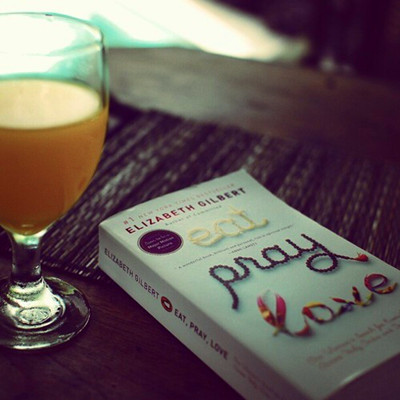
Ketut is relaxed and gracious with his company. He listens to the parents explain their baby's troubles. Then he digs through a small trunk on his porch and pulls out an ancient ledger filled with tiny writing in Balinese Sanskrit. He consults this book like a scholar, looking for some combination of words that will suit him, talking and laughing with the parents the whole time. Then he takes a blank page from a notebook with a picture of Kermit the Frog on it, and writes what he tells me is "a prescription" for the little girl. The child is being tormented by a minor demon, he diagnoses, in addition to the physical discomforts of teething. For the teething, he advises the parents to simply rub the baby's gums with pressed red onion juice. To appease the demon, they must make an offering of a small killed chicken and a small pig, along with a little bit of cake, mixed with special herbs which their grandmother should defin-itely have access to from her own medicine garden. (This food won't be wasted; after the of-fering ceremony, Balinese families are always allowed to eat their own donations to the gods, since the offering is more metaphysical than literal. The way the Balinese see it, God takes what belongs to God—the gesture—while man takes what belongs to man—the food itself.)
After writing the prescription, Ketut turns his back to us, fills a bowl with water, and keens a spectacular, quietly chilling mantra above it. Then Ketut blesses the baby with the water he has just infused with sacred power. Even at one year old, the child already knows how to re-ceive a holy blessing in the traditional Balinese manner. Her mother holds her, and the baby puts out her little plummy paws to receive the water, sips it once, sips it again and splashes the rest on top of her head—a perfectly executed ritual. She could not be less frightened of this toothless old man who is chanting at her. Then Ketut takes the rest of the holy water and pours it into a small plastic sandwich bag, ties the bag at the top and gives it to the family to use later. The mother carries this plastic bag of water away with her as she leaves; it looks like she has just won a goldfish at the state fair, only she forgot to take the goldfish with her.
Ketut Liyer has given this family about forty minutes of his undivided attention, for the fee of about twenty-five cents. If they hadn't any money at all, he would have done the same; this is his duty as a healer. He may turn nobody away, or the gods will remove his talent for healing. Ketut gets about ten visitors a day like this, Balinese who need his help or advice on some holy or medical matter. On highly auspicious days, when everyone wants a special blessing, he might have over one hundred visitors.












